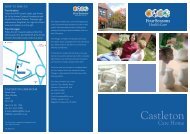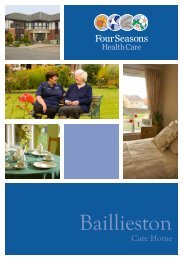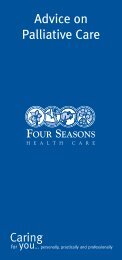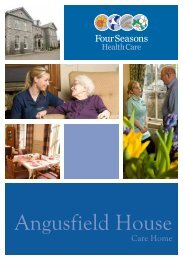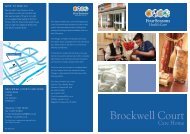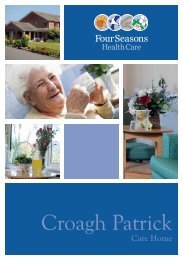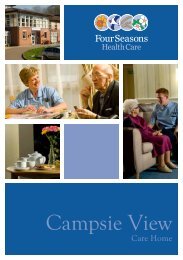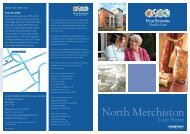Advice on Elder Abuse - Four Seasons Health Care
Advice on Elder Abuse - Four Seasons Health Care
Advice on Elder Abuse - Four Seasons Health Care
Create successful ePaper yourself
Turn your PDF publications into a flip-book with our unique Google optimized e-Paper software.
<str<strong>on</strong>g>Advice</str<strong>on</strong>g> <strong>on</strong><br />
<strong>Elder</strong> <strong>Abuse</strong><br />
FOUR SEASONS<br />
H E A L T H C A R E<br />
Caring<br />
for you... pers<strong>on</strong>ally, practically and professi<strong>on</strong>ally
What is elder abuse<br />
We define elder abuse as: “A single or<br />
repeated act or lack of appropriate acti<strong>on</strong>,<br />
occurring within any relati<strong>on</strong>ship where there<br />
is an expectati<strong>on</strong> of trust, which causes harm<br />
or distress to an older pers<strong>on</strong>”.<br />
What happens and who<br />
is involved<br />
<strong>Abuse</strong> can be seen in many ways, including:<br />
Physical abuse<br />
Psychological abuse<br />
Financial abuse<br />
Sexual abuse<br />
Neglect<br />
<strong>Abuse</strong> can occur anywhere: some<strong>on</strong>e’s own<br />
home, a carer’s home, day care, residential<br />
care, or hospital.<br />
Both older men and women can be at risk<br />
of being abused. The abuser is usually well<br />
known to the pers<strong>on</strong> being abused. They<br />
may be a partner, child or relative, friend<br />
or neighbour, paid or volunteer care worker,<br />
health/social worker, or other professi<strong>on</strong>al.<br />
Older people may also be abused by a<br />
pers<strong>on</strong> they care for. Often, the people who<br />
abuse older people are exploiting a special<br />
relati<strong>on</strong>ship. Very rarely is the abuser<br />
some<strong>on</strong>e who provides a family caring role.<br />
Why does it happen<br />
There are many reas<strong>on</strong>s why abuse occurs<br />
and these may vary with each incident.<br />
Many of its causes are not yet fully<br />
understood. <strong>Abuse</strong> may range from a<br />
sp<strong>on</strong>taneous outburst to systematic<br />
premeditated assaults <strong>on</strong> an older pers<strong>on</strong>.
At home some of the causes may include:<br />
Poor quality l<strong>on</strong>g term relati<strong>on</strong>ships.<br />
A carer’s inability to provide the level<br />
of care required.<br />
A pattern of family violence exists or<br />
has existed in the past.<br />
A carer with mental or physical health<br />
problems.<br />
Social isolati<strong>on</strong> of the family member<br />
In other settings abuse may be a symptom<br />
of a poorly run establishment. It is also likely<br />
to occur when staff are inadequately trained,<br />
poorly supervised, have little support from<br />
management or work in isolati<strong>on</strong>.<br />
What are the signs<br />
Physical abuse:<br />
Symptoms can include: cuts, lacerati<strong>on</strong>s,<br />
wounds, bruises, black eyes, burns or<br />
broken b<strong>on</strong>es, untreated injuries,<br />
poor skin c<strong>on</strong>diti<strong>on</strong>, dehydrati<strong>on</strong> and/or<br />
malnourishment without illness-related cause,<br />
loss of weight. Inappropriate use of<br />
medicati<strong>on</strong>, overdosing or under-dosing.<br />
An older pers<strong>on</strong> telling you they have been<br />
hit, slapped, kicked, or mistreated.<br />
Psychological abuse<br />
Symptoms can include: helplessness,<br />
hesitati<strong>on</strong> to talk openly, c<strong>on</strong>fusi<strong>on</strong> or<br />
disorientati<strong>on</strong>. Anger without apparent cause,<br />
sudden change in behaviour, pers<strong>on</strong> is upset<br />
or agitated, unusual behaviour (sucking,<br />
biting, or rocking), being extremely withdrawn<br />
and n<strong>on</strong> communicative or n<strong>on</strong> resp<strong>on</strong>sive.<br />
An older pers<strong>on</strong> telling you they are being<br />
verbally or emoti<strong>on</strong>ally abused.
Aggressive behaviour by family member<br />
toward the older pers<strong>on</strong>. Inappropriate<br />
display of affecti<strong>on</strong> by the family member<br />
that might be possible indicators of<br />
inappropriate relati<strong>on</strong>ships. Indicati<strong>on</strong>s of<br />
c<strong>on</strong>finement (closed off in a room, tied to<br />
furniture). Obvious absence of assistance.<br />
What to do and who<br />
to c<strong>on</strong>tact<br />
Whether you are pers<strong>on</strong>ally coping with<br />
abuse or whether you are c<strong>on</strong>cerned about<br />
the abuse of another - you are not al<strong>on</strong>e.<br />
<strong>Abuse</strong>rs very often exploit the fact that<br />
some<strong>on</strong>e is (or feels) isolated. Very often,<br />
they will rely <strong>on</strong> some<strong>on</strong>e not disclosing,<br />
or the natural disbelief that many people<br />
have when c<strong>on</strong>sidering elder abuse.<br />
It is important to protect yourself if you are<br />
an older pers<strong>on</strong>. It is also important that<br />
neighbours, friends, families and practiti<strong>on</strong>ers<br />
are alert to the possibility of abuse and are<br />
therefore ready to act <strong>on</strong> c<strong>on</strong>cerns or<br />
suspici<strong>on</strong>s. Often abusers are <strong>on</strong>ly successful<br />
because they keep you quiet or stop others<br />
from finding out what is happening to you.<br />
It is therefore wise to:<br />
Maintain c<strong>on</strong>tact with any friends or<br />
neighbours if you move to a new address.<br />
If you cannot go to see them, try to write<br />
letters regularly telling them about your new<br />
life and what is happening to you. Encourage<br />
friends to visit you at home and try to join a<br />
local group or club. The more interacti<strong>on</strong> you<br />
have with other people the less chance there<br />
will be for you to become isolated.<br />
Have regular medical or dental appointments.<br />
Dentists and GP’s are people who should be<br />
able to talk to you, or spot signs that you<br />
are being abused.
Financial abuse<br />
Signs can include: signatures <strong>on</strong> cheques<br />
etc. that do not resemble the older pers<strong>on</strong>’s<br />
signature. Unexplained withdrawal of large<br />
sums of m<strong>on</strong>ey by a pers<strong>on</strong> accompanying<br />
the older pers<strong>on</strong>, the inclusi<strong>on</strong> of additi<strong>on</strong>al<br />
names <strong>on</strong> an older pers<strong>on</strong>’s bank account.<br />
Changes to wills. The sudden appearance of<br />
previously uninvolved relatives claiming their<br />
rights to an older pers<strong>on</strong>’s affairs or<br />
possessi<strong>on</strong>s. Lack of amenities, such as TV,<br />
pers<strong>on</strong>al grooming items, appropriate<br />
clothing that the older pers<strong>on</strong> should be<br />
able to afford. Disappearance of funds or<br />
possessi<strong>on</strong>s.<br />
Sexual abuse<br />
Signs can include: bruises, unexplained<br />
venereal disease or infecti<strong>on</strong>. Torn or stained<br />
underclothing. An older pers<strong>on</strong> telling you<br />
they have been sexually assaulted or raped.<br />
Neglect<br />
Symptoms include: smells, or other health<br />
and safety hazards in older pers<strong>on</strong>’s living<br />
envir<strong>on</strong>ment. Rashes or sores and older<br />
pers<strong>on</strong> is inadequately clothed.<br />
Malnourishment. Untreated medical<br />
c<strong>on</strong>diti<strong>on</strong>s, poor pers<strong>on</strong>al hygiene or<br />
unsanitary and unclean c<strong>on</strong>diti<strong>on</strong>s.<br />
Family abuse<br />
It is rare to uncover abuse by a family<br />
member who provides direct support to an<br />
older pers<strong>on</strong>. It is more likely to be a s<strong>on</strong>,<br />
daughter or a partner who provides no<br />
practical or emoti<strong>on</strong>al support. However,<br />
symptoms can include: The older pers<strong>on</strong><br />
may not be allowed to speak for themselves,<br />
or see others, without the presence of the<br />
family member (suspected abuser) being<br />
present.
Make sure that people are aware that you<br />
know where you have put important<br />
documents and always open and post your<br />
own mail. If you have to rely <strong>on</strong> others to<br />
post your mail then try to use more than<br />
<strong>on</strong>e pers<strong>on</strong>. D<strong>on</strong>’t leave cash, jewellery, or<br />
valuable possessi<strong>on</strong>s lying about. If some<strong>on</strong>e<br />
asks you to sign a Power of Attorney, always<br />
get independent advice to make sure you<br />
understand what it means.<br />
For further<br />
informati<strong>on</strong><br />
c<strong>on</strong>tact Acti<strong>on</strong><br />
<strong>on</strong> <strong>Elder</strong> <strong>Abuse</strong><br />
<strong>on</strong> Freeph<strong>on</strong>e<br />
0808 808 8141<br />
FOUR SEASONS<br />
H E A L T H C A R E<br />
Emers<strong>on</strong> Court, Alderley Road,<br />
Wilmslow, Cheshire SK9 1NX<br />
Tel: 01625 417800<br />
Fax: 01625 417827<br />
E-mail: fourseas<strong>on</strong>s@fshc.co.uk<br />
Website: www.fshc.co.uk



